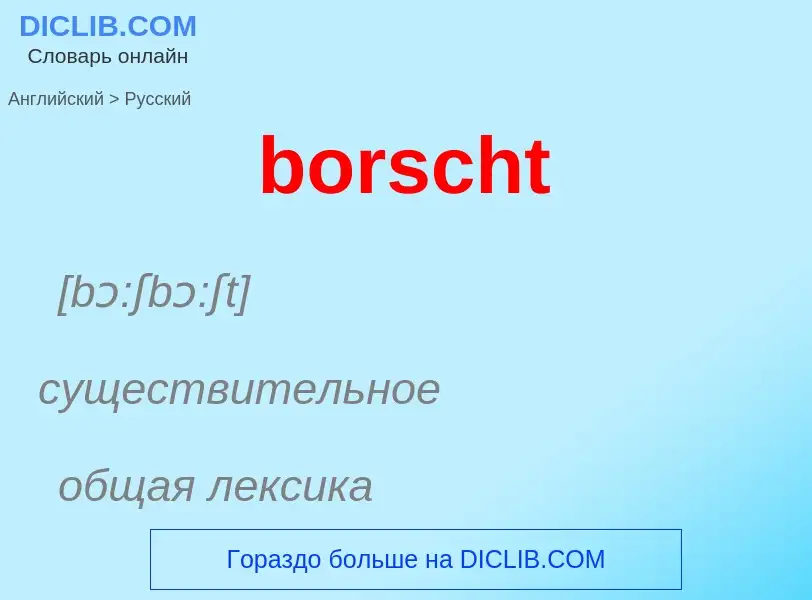Vertaling en analyse van woorden door kunstmatige intelligentie ChatGPT
Op deze pagina kunt u een gedetailleerde analyse krijgen van een woord of zin, geproduceerd met behulp van de beste kunstmatige intelligentietechnologie tot nu toe:
- hoe het woord wordt gebruikt
- gebruiksfrequentie
- het wordt vaker gebruikt in mondelinge of schriftelijke toespraken
- opties voor woordvertaling
- Gebruiksvoorbeelden (meerdere zinnen met vertaling)
- etymologie
BORSCHT - vertaling naar russisch
[bɔ:ʃbɔ:ʃt]
существительное
общая лексика
борщ
[bɔ:ʃbɔ:ʃt]
существительное
общая лексика
борщ
Definitie
Wikipedia

Borscht (English: (listen)) or barszcz is a sour soup common in Eastern Europe and Northern Asia. In English, the word "borscht" is most often associated with the soup's variant of Ukrainian origin, made with red beetroots as one of the main ingredients, which give the dish its distinctive red color. The same name, however, is also used for a wide selection of sour-tasting soups without beetroots, such as sorrel-based green borscht, rye-based white borscht, and cabbage borscht.
Borscht derives from an ancient soup originally cooked from pickled stems, leaves and umbels of common hogweed (Heracleum sphondylium), a herbaceous plant growing in damp meadows, which lent the dish its Slavic name. With time, it evolved into a diverse array of tart soups, among which the Ukrainian beet-based red borscht has become the most popular. It is typically made by combining meat or bone stock with sautéed vegetables, which – as well as beetroots – usually include cabbage, carrots, onions, potatoes, and tomatoes. Depending on the recipe, borscht may include meat or fish, or be purely vegetarian; it may be served either hot or cold, and it may range from a hearty one-pot meal to a clear broth or a smooth drink. It is often served with smetana or sour cream, hard-boiled eggs or potatoes, but there exists an ample choice of more involved garnishes and side dishes, such as uszka or pampushky, that can be served with the soup.
Its popularity has spread throughout Eastern Europe and – by way of migration away from the Russian Empire – to other continents. In North America, borscht is often linked with either Jews or Mennonites, the groups who first brought it there from Europe. Several ethnic groups claim borscht, in its various local guises, as their own national dish consumed as part of ritual meals within Eastern Orthodox, Greek Catholic, Roman Catholic, and Jewish religious traditions.
In 2022, the United Nations Educational, Scientific, and Cultural Organization (UNESCO) announced that it had placed borscht on the List of Intangible Cultural Heritage in Need of Urgent Safeguarding due to the risk that Russia's invasion posed to the soup's status as an element of Ukraine's cultural heritage. The new status means Ukraine could now apply for special funds to finance projects promoting and protecting the dish.


![[[uszka]]}}'', or ear-shaped mushroom-filled dumplings [[uszka]]}}'', or ear-shaped mushroom-filled dumplings](https://commons.wikimedia.org/wiki/Special:FilePath/Barszcz z uszkami.jpg?width=200)
![''salo'' (lard)]], beetroots, cabbage, carrots, celeriac, onions, potatoes, mushrooms, tomato paste, parsley, chives, dill, bay leaves, allspice and black pepper. ''salo'' (lard)]], beetroots, cabbage, carrots, celeriac, onions, potatoes, mushrooms, tomato paste, parsley, chives, dill, bay leaves, allspice and black pepper.](https://commons.wikimedia.org/wiki/Special:FilePath/Borsch-con-fungi 032.jpg?width=200)
![Tubed borscht as [[space food]] Tubed borscht as [[space food]]](https://commons.wikimedia.org/wiki/Special:FilePath/Borsch-tube.jpg?width=200)
![Poltava borscht with ''[[halushky]]'' Poltava borscht with ''[[halushky]]''](https://commons.wikimedia.org/wiki/Special:FilePath/Borsch z galuschkamy 02.jpg?width=200)



![green borscht]] served with sour cream and a hard-boiled egg green borscht]] served with sour cream and a hard-boiled egg](https://commons.wikimedia.org/wiki/Special:FilePath/Borscz zelenyj ukr.jpg?width=200)
![pork cracklings]] and sour cream pork cracklings]] and sour cream](https://commons.wikimedia.org/wiki/Special:FilePath/Borshch2.jpg?width=200)


.jpg?width=200)


![A [[tureen]] of thick borscht A [[tureen]] of thick borscht](https://commons.wikimedia.org/wiki/Special:FilePath/Russkij-Borschtsch.jpg?width=200)
![[[shchi]]}}''. [[shchi]]}}''.](https://commons.wikimedia.org/wiki/Special:FilePath/Shchi.jpg?width=200)
![[[Auguste Escoffier]], known in France as the "king of chefs and chef of kings", was fascinated by borscht's ruby-red color. [[Auguste Escoffier]], known in France as the "king of chefs and chef of kings", was fascinated by borscht's ruby-red color.](https://commons.wikimedia.org/wiki/Special:FilePath/Ukranian borscht.jpg?width=200)
![A [[tureen]] of clear borscht among other dishes on a Polish [[Christmas Eve]] table A [[tureen]] of clear borscht among other dishes on a Polish [[Christmas Eve]] table](https://commons.wikimedia.org/wiki/Special:FilePath/Wigilia potrawy 554.jpg?width=200)

![white borscht]] served over fresh sausage, bacon and eggs white borscht]] served over fresh sausage, bacon and eggs](https://commons.wikimedia.org/wiki/Special:FilePath/Żurek.jpg?width=200)
